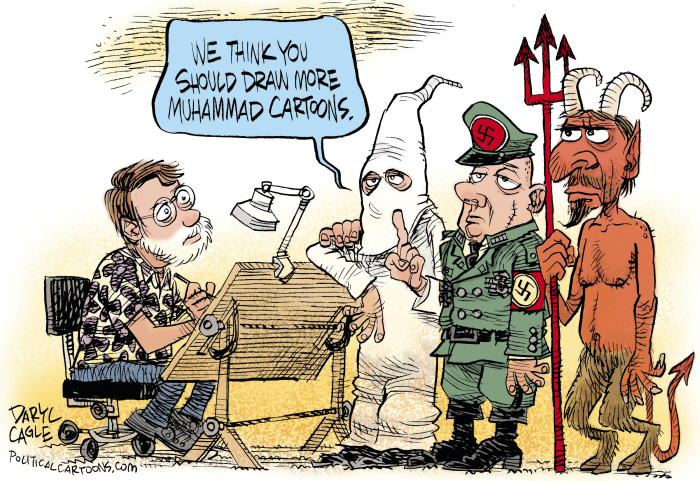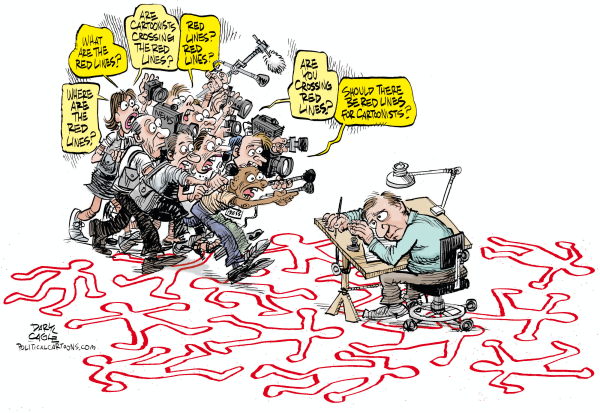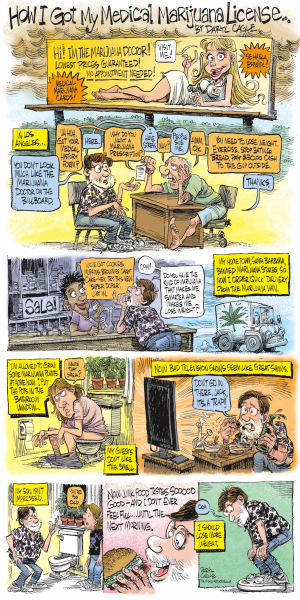My Cartoonist Week in Algiers
One fun thing about being an editorial cartoonist is that I sometimes get invited to strange places as a cartoon celebrity. I just finished a week in Algiers at their second annual comics festival. Algeria is a huge country, a former socialist member of the Soviet bloc and a former French colony in North Africa.
The people here like to be thought of as more European than Arab, and they seem relieved that their country has recently emerged from many years of internal violence. There was an ugly civil war here in the 1990s that has wound down to the point where Algiers is pretty safe, but there are military guards with machine guns everywhere, and we can’t drive very far without going through armed checkpoints. That is probably why it is safe.
The “Casbah” is the old part of Algiers that is a giant bazaar. The streets in the Casbah are too narrow for cars. The bustling Casbah is filled with tiny shops and tables with every kind of stuff – except tourist junk, because there are so few tourists here. Algeria isn’t an easy place for a tourist to visit, so we don’t see Algiers t-shirts or snow globes; I saw no Starbucks and no McDonald’s.
The language here is a confusing mish-mash of French and Arabic. The economy is a mish-mash too; the government seems to still have its head stuck in a Socialist past. Under a new law, consumer credit is banned in Algeria. Any business in Algeria must be 51 percent owned by Algerians, driving foreign investment away. Getting anything done here is a quest. People don’t show up on time and don’t seem to have much concern about productivity. There is a lot of confusion. The economy is sustained by oil revenue.
Since emerging from the violence there seems to be a yearning for a cultural renaissance here, and the cartoon arts benefit from that. Algerians like a strange mix of Arabic manga and euro-style storytelling comics, but the star cartoonists are political cartoonists. The most famous cartoonist here is Ali Dilem, the cartoonist for the French-language newspaper Liberté.
Algerian cartoonists struggle under pressure from the government. I’m told that Ali Dilem, who now lives outside of Algeria, faces 25 lawsuits from government officials he has insulted in his cartoons. The threat of civil suits may keep some cartoonists from criticizing the government, but the cartoonists I met seemed eager to continue pushing the limits. They were all very interested in what the limits were for American political cartoonists, expecting that we had similar problems with our government.
There was an exhibition of the work of a famed Algerian cartoonist named “Slim,” who has drawn socially conscious newspaper comic strips for decades here, and saw some of his cartoonist colleagues killed in the violence of the 1990s. Slim likes making fun of Algerian women who wear veils; he draws the veils much like the beak of a bird, and has the women walk around looking like ducks.
The comics festival invited cartoonists from all over the world to attend; names I’d never heard of, from strange, exotic places. In many countries, editorial cartoonists are the most important cartoonists, and there were quite a few editorial cartoonists here — a candy store for me since I’m an international editorial cartooning buff. The festival was really very nice.
A question I got a lot was, “Have you drawn any cartoons about Algeria?” I haven’t. It is hard to think of when Algeria was in the headlines in America. The only time I remember reading about Algeria is when Algerian President Bouteflika was quietly hanging out with his more vocal buddies Fidel Castro, Hugo Chavez and Evo Morales, affirming their coalition against evil America.
President Bouteflika won re-election recently with an unbelievable 90 percent of the vote. One Algerian told me that even the Prophet Muhammad himself couldn’t really get 90 percent of the vote.
Maybe I’ll draw a cartoon about Algeria. We’ll see.
Daryl Cagle is a political cartoonist and blogger for MSNBC.com; he is a past president of the National Cartoonists Society and his cartoons are syndicated to more than 850 newspapers, including the paper you are reading. Daryl’s books “The BIG Book of Campaign 2008 Political Cartoons” and “The Best Political Cartoons of the Year, 2010 Edition” are available in bookstores now.















